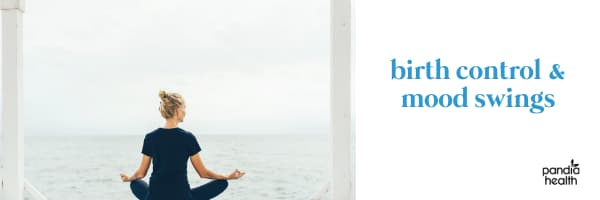Many women already experience mood swings before and/or during their period, but do these persist even when you skip your period while taking birth control? In an effort to answer this question and satisfy our curiosity, Pandia Health’s wonderful CEO & co-founder, Dr. Sophia Yen has provided some expert insight on the topic.
Q: How do hormonal contraceptives work?
Dr. Yen: All hormonal contraceptives come with progesterone or a combination of progesterone and estrogen. Both types work by blocking ovulation (i.e. the release of an egg), thinning the lining of the uterus (a.k.a endometrium), and thickening the cervical mucus plug to prevent sperm from entering the uterus.
Q: Is there a link between birth control and emotions?
Dr. Yen: In short, maybe.
The estrogen in some types of birth control is known to increase levels of the neurotransmitter serotonin, which is the chemical in our brains that generally causes positive mood and emotional well-being. However, too much serotonin can cause increased anxiety. Furthermore, some individuals notice changes in their mood while taking birth control.
With that being said, each person with a uterus responds differently to the estrogen and progestin (synthetic progesterone) in birth control. There are eight different progestins and two to three different levels of estrogen/progestins. In total, there are 40+ different types of birth control pills. If the first one you try doesn’t work, you can always switch to something else.
When you are not on hormonal birth control, your hormones cycle up and down. Most people with uteri benefit from being on hormonal contraception, specifically monophasic birth control, as it helps keep your hormones at a steady, smooth level. Not to mention the fact that with the pill, you can choose if and when to get your period. If you choose to opt out by skipping the row of placebo pills and moving right to the next pill pack, you can avoid a bleed altogether. And without a drop in hormones, you’re less likely to experience mood swings.
If you want to learn more about how to make #PeriodsOptional, check out my TEDx talk on the science and safety of #NoPeriods or #FewerPeriods with birth control.
Q: What are the symptoms of premenstrual syndrome (PMS)?
Dr. Yen: Before your period, you may experience:
Emotional and behavioral signs and symptoms, which can include:
- Tension or anxiety
- Depressed mood
- Crying spells
- Irritability or anger
- Appetite changes and food cravings
- Trouble falling asleep (insomnia)
- Social withdrawal
- Poor concentration
- Change in libido
Physical signs and symptoms, like:
- Joint or muscle pain
- Headache
- Fatigue
- Bloating related to fluid retention
- Breast tenderness
- Acne flare-ups
- Constipation or diarrhea
- Alcohol intolerance
Premenstrual dysphoric disorder (PMDD), a severe version of PMS. This can manifest itself in:
- Anger/irritability
- Mood swings
- Depression
- Anxiety
- Social withdrawal
- Difficulty focusing
- Lethargy
- Trouble sleeping
- Appetite changes
- A feeling of being overwhelmed
- Loss of productivity
Q: If scientists can’t firmly connect the dots between birth control hormones and emotional turbulence, why do some women believe there’s a link?
Dr. Yen: While a strong link has not yet been established, there is evidence to support the relationship between birth control and improved mood. A study from 2013 showed that, at ages 25–34 years, hormonal contraceptive users had lower mean levels of concurrent depressive symptoms (β = −1.04, 95% confidence interval: −1.73, −0.35) and were less likely to report a past-year suicide attempt (odds ratio = 0.37, 95% confidence interval: 0.14, 0.95) than women using low-efficacy contraception or no contraception.
Another study that compared emotional effects of different types of birth control methods demonstrated that:
- Compared with non-users, combined oral contraceptives had a RR (instance rate ratio) of a first antidepressant use of 1.2 (95% CI, 1.22 to 1.25)
- Progestin-only pills had an RR of 1.3 (95% CI, 1.27-1.40)
- IUD with hormone a levonorgestrel intrauterine system, 1.4 (95% CI, 1.31-1.42)
- Vaginal ring (etonogestrel), 1.6 (95% CI, 1.55-1.69)
- Transdermal patch (norelgestromin), 2.0 (95% CI, 1.76-2.18)
- Implant, 2.1 (95% CI, 2.01-2.24)
- The shot (medroxyprogesterone acetate depot), 2.7 (95% CI, 2.45-2.87)
Basically – the shot had the highest correlation with depression, whereas the combination pill posed the lowest risk of depression.
Let’s remember that each woman may react differently to the various types of hormonal birth control. For this reason, it is always a best practice to consult a doctor before starting birth control or switching methods.
Q: When should you see a doctor?
Dr. Yen: If you notice that you are feeling more depressed/anxious on your new medication, give it 1-2 months. But if it is unbearable, call 911. It’s okay to advocate for yourself when you feel like something isn’t right!
How can Pandia Health help?
Pandia Health is here to make sure your experience with birth control is easy and pleasant. We are the ONLY women-led, doctor-led birth control delivery company. Dr. Yen has personally written over 2,000 birth control prescriptions in the past two years.
If you live in select states, you can sign up for online consultation with one of our expert doctors. You can also transfer a current prescription to our pharmacy and get it delivered right to your mailbox for FREE.
With Pandia Health, you can #SkipTheTrip to the pharmacy and feel confident that you will never run out of birth control on our watch.
Disclaimer: The above information is for general informational purposes only and is NOT a substitute for professional medical advice. Always seek the advice of your doctor/primary care provider before starting or changing treatment.

